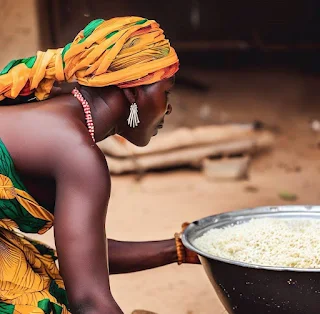No Meat Thick Rice Stew
West African no-meat thick rice stew is a hearty rice stew with a rich blend of fresh vegetables, brown rice, palm butter, and vegetable stock, creating a warm and nourishing soup that will make you feel right at home. If you have leftovers, fear not - this soup can be enjoyed again later, but you may consider adding a bit of vegetable broth or water to thin it out when reheating.
Palm butter is an ingredient widely used in African cuisine due to its distinctive rich, earthy flavor and creamy texture. Consider using coconut cream, peanut butter, or cashew cream if you want a substitute. However, remember that the taste may differ, and you should adjust the quantities according to your taste preferences.
However, if you can access palm butter, it is recommended to use it as it has a unique flavor that is both rich and earthy. It has a mild nutty taste with a hint of sweetness that adds a great depth of flavor to any dish.
No-Meat Thick Rice Stew from West Africa
Prep Time: 15 mins
Cook Time: 20 mins
Total Time: 35 mins
Ingredients
2 cups uncooked brown rice
1 large onion chopped
3 green spring onions chopped
3 garlic cloves minced
1 large ripe tomato diced
1 large green bell pepper diced
1 large yellow bell pepper diced
1 large red bell pepper diced
2 hot peppers diced
4 cups vegetable broth
¾ cup all-purpose flour
1 small can of tomato paste
½ teaspoon salt
½ teaspoon ground black pepper
2 tablespoons unsalted butter
2 tablespoons palm butter
Directions
In a large pot over medium heat, add broth and butter. Bring to a boil, then stir in rice. Cover and remove from heat. Mix well with flour, salt, and pepper in a small bowl with 1/2 cup of water. Melt palm butter in a medium saucepan over medium heat, add vegetables, and saute until slightly firm, about 5 minutes. Reduce heat to low, then add flour mixture, a few tablespoons at a time, into the pot of broth, stirring continuously to avoid clumps. Cook until thickened, about 5 minutes. Add vegetables to the broth mixture. Cook 10 minutes longer and serve as a main dish with bread or a side dish with fish or chicken.



